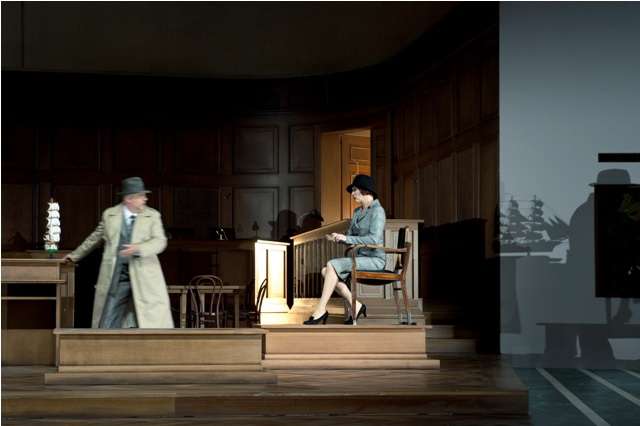|
Back
Every Miracle Needs an Explanation Salzburg
Salzburger Festspiele
08/10/2011 - & August 13, 18*, 25, 30, 2011
Leos Janácek: Vec Makropulos
Angela Denoke (Emilia Marty), Raymond Very (Albert Gregor), Peter Hoare (Vitek), Jurgita Adamonyte (Krista), Johan Reuter (Jaroslav Prus), Jochen Schmeckenbecher (Dr. Kolenaty), Ales Briscein (Janek), Linda Ormiston (Scottish servant), Peter Lobert (civil servant), Ryland Davies (Hauk-Sendorf)
Vienna Philharmonic Orchestra, Vienna State Opera Chorus, Esa-Pekka Salonen (conductor)
Christof Marthaler (director), Anna Viebrock (set and costume designer), Olaf Winter (lighting designer)

J. Schmeckenbecher & A. Denoke (© Walter Mair)
Markus Hinterhäuser’s one-season interregnum as intendant of the Salzburg Festival separates Jürgen Flimm’s early but not much lamented departure from the post and Alexander Pereira’s boldly heralded assumption of it next year. Among this summer’s three new productions, Janácek’s opera, misleadingly called The Makropoulos Case in English (the Czech title Vec Makropulos, or “The Makropolous Thing,” refers to the opera’s magic spell for eternal youth rather than the legal case that surrounds it) threatened a Regietheater interpretation by the German director Christof Marthaler, who has prepared the work for Salzburg and Poland’s Teatr Wielki. Marthaler’s effort has odd features, indeed, recalling that the stage play upon which the opera is based, by Czech satirist Karel Capek, was intended to be a comedy. The music is preceded by a humorous silent conversation (the words appear on the supertitles) between a young woman and an old woman about the nature and desirability of immortality. This is of course the opera’s major theme, though the conversing ladies can only agree that immortality is not for everyone before the younger one storms out for fresh air. Anna Viebrock’s sleek sets and costumes place all three of the opera’s acts in the same 1920s-era judicial surroundings, a room with dark wood panels and benches that can be taken as either Dr. Kolenaty’s law office or a courtroom, depending on what is happening on stage. This leads to more hijinks, some of it funny, but most of it puzzling. The latter includes a crowd of pedestrians who enter at the beginning of Act III, mildly laugh for no apparent reason, exit, and then enter again, as well as judges who sleep through Emilia Marty’s confession of her 337-year existence and the pain and loneliness it has caused her. Are popular opinion and justice blind to existential suffering? Can they not accept the supernatural and the spiritual dimensions of the human psyche that lie behind it? These are questions at the heart of modern life, but it was unclear if this production has an answer to them. Nevertheless, removing intermissions to combine the opera’s three acts into nearly two hours of continuous action heightened the dramatic effect of the opera’s ghost story plot.
The musical effort overcame the abstruse symbolism. The central role of Emilia Marty fell to the capable soprano Angela Denoke, one of the best singers in the modernist repertoire that emerged in angstful Central Europe during the era around World War I. Radiant tones confidently combined the character’s irresistible beauty with her monstrous contempt for life and humanity. Yet, none of this cold stridency detracted from the emotional effect of her final embrace of death and passing of the spell to the young Krista, capably sung by Jurgita Adamonyte. Denoke’s delivery of Emilia’s third act monologue could not leave any doubt about Krista’s wisdom in burning the spell, in this production while nervously puffing a cigarette. The outstanding star performance complemented the opera’s remaining cast, which essentially functions as an ensemble that reacts to Emilia’s unexplained obsession with the spell and then her bizarre tale. American tenor Raymond Very took on the role of Albert Gregor, who longs for the disputed estate; he includes the spell without knowing of its importance, with a skilled reading of the music in all its desperation. It was hard to feel sympathy for such a hapless character, but that was clearly the point. The sturdy baritone Johan Reuter endowed the role of Jaroslav Prus, who possesses the estate, with a debonair self-assurance probably meant to be read as arrogance. Jochen Schmeckenbecher’s memorable Kolenaty captured the role’s officiousness and disbelief. Ryland Davies impressed as Hauk-Sendorf, an ancient admirer of one of Emilia Marty’s earlier personae who is ecstatic to find her again.
Perhaps the Salzburg Festival’s greatest treat is hearing the Vienna Philharmonic playing operatic scores in the pits of its fine halls, in this case the Grosses Festspielhaus. Under Esa-Pekka Salonen, arguably today’s leading Janácek conductor, it delivered the dissonant score’s complexities with unmatched excellence.
Paul du Quenoy
|